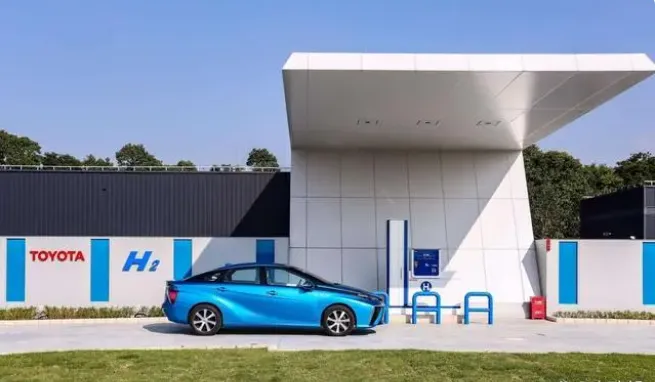Hydrogen Fuel Cell Vehicles: Clean and Efficient Transportation in the Future
Hydrogen Fuel Cell Vehicles
Hydrogen Fuel Cell Vehicles
With the increasing attention to environmental protection and sustainable energy, hydrogen fuel cell vehicles have attracted much attention as a clean and efficient means of transportation. This article will describe how hydrogen fuel cell vehicles work, their benefits and challenges, and explore their potential in the future of transportation.

A hydrogen fuel cell vehicle is a vehicle that uses hydrogen as fuel and generates electricity through a hydrogen fuel cell to drive an electric motor. Its working principle is based on the chemical reaction of hydrogen and oxygen in a hydrogen fuel cell to generate electricity and water vapor. This electrical energy is used to power an electric motor, which propels the car forward. Compared with traditional fuel vehicles, the exhaust gas of hydrogen fuel cell vehicles is only water vapor, without any harmful gas emissions, and has zero pollution to the environment.
Hydrogen fuel cell vehicles have many advantages. First of all, they are environmentally friendly due to their zero-emission characteristics. Because the only byproduct of hydrogen combustion is water vapor, hydrogen fuel cell vehicles can significantly reduce air pollution and greenhouse gas emissions, helping to improve air quality and mitigate climate change. Second, hydrogen fuel cell vehicles have high energy density and long cruising range. Compared with the battery pack of traditional electric vehicles, hydrogen fuel cells have higher energy density, can provide longer driving range, and are more suitable for long-distance driving. In addition, hydrogen fuel cell vehicles take a relatively short time to refuel with hydrogen, which is more convenient than traditional rechargeable electric vehicles.
However, hydrogen fuel cell vehicles face some challenges. First, the production and storage of hydrogen remains a problem. Currently, most hydrogen is produced through reforming of fossil fuels or electrolysis of water, processes that require large amounts of energy and resources. In addition, hydrogen storage and transport also require special equipment and infrastructure, adding cost and complexity. Second, the cost of hydrogen fuel cell vehicles is still high. Compared with traditional fuel vehicles and electric vehicles, hydrogen fuel cell vehicles have higher manufacturing and maintenance costs, which limits their market penetration.
Despite some challenges, hydrogen fuel cell vehicles still hold great potential in the future of transportation. With the advancement of technology and the deepening of research and development, the production cost and storage technology of hydrogen will be improved, thereby reducing the cost of hydrogen fuel cell vehicles. Furthermore, with the widespread use of renewable energy sources such as solar and wind power, the production of hydrogen will become more environmentally friendly and sustainable. While building a complete hydrogen infrastructure, the support and investment of the government and enterprises will also promote the development of hydrogen fuel cell vehicles.
Overall, hydrogen fuel cell vehicles have many advantages as a clean and efficient means of transportation. They are characterized by zero emissions, high energy density and long cruising range, and are expected to become an important choice in the field of transportation in the future. Despite some challenges, the market share and sustainability of hydrogen fuel cell vehicles will continue to increase as technology and infrastructure advance.
 English
English Español
Español Português
Português русский
русский français
français 日本語
日本語 Deutsch
Deutsch Tiếng Việt
Tiếng Việt Italiano
Italiano Nederlands
Nederlands ไทย
ไทย Polski
Polski 한국어
한국어 Svenska
Svenska magyar
magyar Malay
Malay বাংলা
বাংলা Dansk
Dansk Suomi
Suomi हिन्दी
हिन्दी Pilipino
Pilipino Türk
Türk Gaeilge
Gaeilge عربى
عربى Indonesia
Indonesia norsk
norsk اردو
اردو čeština
čeština Ελληνικά
Ελληνικά Українська
Українська فارسی
فارسی български
български Latine
Latine slovenský
slovenský Eesti Keel
Eesti Keel Српски
Српски Esperanto
Esperanto Afrikaans
Afrikaans icelandic
icelandic Беларус
Беларус Hrvatski
Hrvatski Bosanski
Bosanski Maori
Maori Монгол хэл
Монгол хэл Hmong
Hmong Somali
Somali Точик
Точик O'zbek
O'zbek Hawaiian
Hawaiian Philippine
Philippine

Hydrogen Fuel Cell Vehicle Power Supply: Revolutionizing Clean Transportation
As the automotive industry continues to seek sustainable alternatives to traditional gasoline and diesel engines, hydrogen fuel cell vehicles (FCVs) are emerging as a promising solution. Powered by hydrogen fuel cells, these vehicles offer a clean, efficient, and sustainable alternative to conventional internal combustion engine vehicles. The power supply system of a hydrogen fuel cell vehicle plays a crucial role in determining its performance, efficiency, and environmental benefits.
Read MoreApplication market of hydrogen fuel cells: welcoming the future of clean energy
With the increasing global demand for clean energy, hydrogen fuel cell technology, as a green and environmentally friendly energy solution, is gradually penetrating into multiple industries. Its zero-emission and high-efficiency characteristics make its application prospects in transportation, energy storage, industry and other fields more and more broad. The following is the current application status and future potential of hydrogen fuel cells in major markets.
Read MoreHydrogen Energy System: Advantages for a Sustainable Future
As the world transitions toward cleaner, more sustainable energy sources, hydrogen energy systems are emerging as a powerful solution with significant advantages. With growing concerns about climate change and the need for carbon reduction, hydrogen energy offers a promising path to decarbonize industries, transportation, and power generation. Here are some of the key benefits of hydrogen energy systems.
Read More